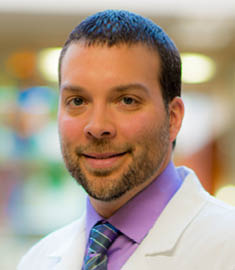
Ryan Dempewolf
MD
Dr. Dempewolf is a board-certified otolaryngologist with Physicians’ Clinic of Iowa Ear, Nose & Throat. He provides medical and surgical treatment for disorders of the ear, nose and throat including thyroid and head and neck cancers.
How Common is Thyroid Cancer?
We typically have fewer than 100 cases per year in our community. However, the incidence has been increasing, largely because technology has enhanced our ability to detect thyroid nodules.
Are There Different Types of Thyroid Cancer?
Yes. Papillary thyroid carcinoma and follicular thyroid carcinoma account for about 90 percent of cases. Fortunately, these types of cancers can be treated relatively simply with good outcomes.
Who is at Risk for Thyroid Cancer?
It’s more common in women, and most cases we see are adults in their 40s or 50s. A very small number of cases occur in children and teens.
How is It Treated?
Most people have surgery to remove their thyroid gland, followed by treatment with radioactive iodine. Unlike radiation therapy, the patient simply swallows the iodine in a capsule or liquid form. Long-term they’ll also need to take replacement thyroid hormone.
We are always watching for updated or new guidelines on how we treat any cancer. Sometimes a more conservative approach can be taken. Many factors can play into a patient’s diagnosis including genetics and health behavior choices. There is a lot to consider when deciding on a patient’s treatment plan and long-term surveillance.
What is the Outlook for Someone with Thyroid Cancer?
The outcome for well-differentiated papillary or follicular cancer (the most common types) is very good. After treatment, thyroid cancer patients are usually very healthy. I encourage them to play a role at the Community Cancer Center by encouraging and mentoring other cancer patients.
For more information about thyroid cancer or available support services, contact the Community Cancer Center at (319) 558-4876.







